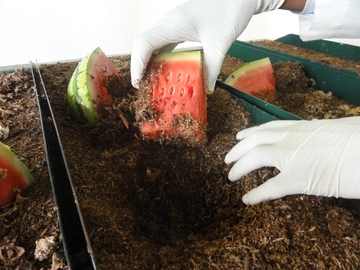Insects meet an increasing demand for alternative animal proteins
November 21, 2016.
Scholars project an exponential rise in future demand for animal protein. This demand is currently met by the constant expansion of intensive livestock production. But this development is environmentally unsustainable because livestock production already accounts for the largest share of agricultural land use, either for grazing or producing feed crops. An environmentally sustainable alternative to intensive livestock production needs to be found to ensure a more food-secure world in future.
A significant amount of annual global food production is wasted, both pre- and post-harvest. Vegetables and fruits account for almost half of that waste. Food waste has been traditionally used in compost and feed production. However, traditional conversion systems are time-consuming and inefficient.
Bioconversion — the process of converting food waste into insect larval biomass and organic residues — can be an alternative to these present practices. Bioconversion reduces the amount of organic material using biological processing agents such as microorganisms or enzymes that transform organic material into usable products or energy sources, thus providing greater spatial potential for landfills and waste containers.
Edible insects require up to six times less feed than livestock for the production of the same amount of high quality protein. They provide oils, vitamins and minerals but emit less greenhouse gases and ammonia than livestock. This opens up a potentially powerful source of foodfor direct human consumption or for protein in livestock feed meal mixtures.
ZEF research on the black soldier flies
ZEF researchers are currently engaged in exploring the use of black soldier flies (Hermetia illucens) for feed production and as a potential candidate for the bioconversion of organic waste and have come up with the following preliminary results and conclusions: Black soldier flies efficiently convert various organic wastes into high-profile protein through decomposition. The flies have a global distribution, including most tropical and subtropical regions, and can tolerate extreme temperatures.
Black soldier flies have been successfully used for waste management. They can also make use of various nutrients abundant in waste streams. In particular, Black soldier fly larvae can reduce a significant amount of food, animal, and sewage waste. The insects are not pests and actually deter the common houseflies that are normally linked to waste, low hygiene and poor health standards. When compared to livestock, the flies have some distinct advantages: They are cold-blooded and they can convert feed into edible products much more efficiently. They emit considerably less ammonia and greenhouse gases than conventional livestock, and, of course, they occupy less space.
Moreover, Black soldier flies have the ability to inactivate and reduce harmful microbial contaminants in waste streams by modifying the microflora of the waste. The flies also show some potential in reducing heavy-metal traces by incorporating and concentrating nutrients from waste samples into livestock feed. This reduces the pollution potential by 50 to 60 percent or more. After bioconversion, the remaining waste can be used as a bio-fertilizer.
Insect meal is a nutritional product prepared by drying and pulverizing insects. The meal promotes food assimilation and growth in animals because it is rich in protein, oils, essential minerals and vitamins. It can substitute the costly fishmeal, soymeal, and grains that are routinely added to livestock feed in order to promote food assimilation and growth in animals. Insects like Black soldier flies are good alternatives because of their ability to efficiently transform waste into high protein products. Clearly, edible insects provide a promising future source for animal protein. Yet, there remain many challenges to their use. The sustainable harvest of these insects is one. Producing numbers that can meet rising global demand is another. So far, most edible insects have been collected from nature. But their potential future use as feed meal will require large-scale production. In addition, legislation on their production and use needs to be developed to address sustainability and food safety.
See a longer version of this article:
Shumo, M. 2016. Black Soldier Fly: A Bio Tool for Converting Food Waste into Livestock Feed. Solutions 7(4): 36-39. bit.ly/black-soldier-fly
<link fileadmin webfiles zef_news no_34 zefnews_34.pdf download file>This article was published in ZEFNews 34


